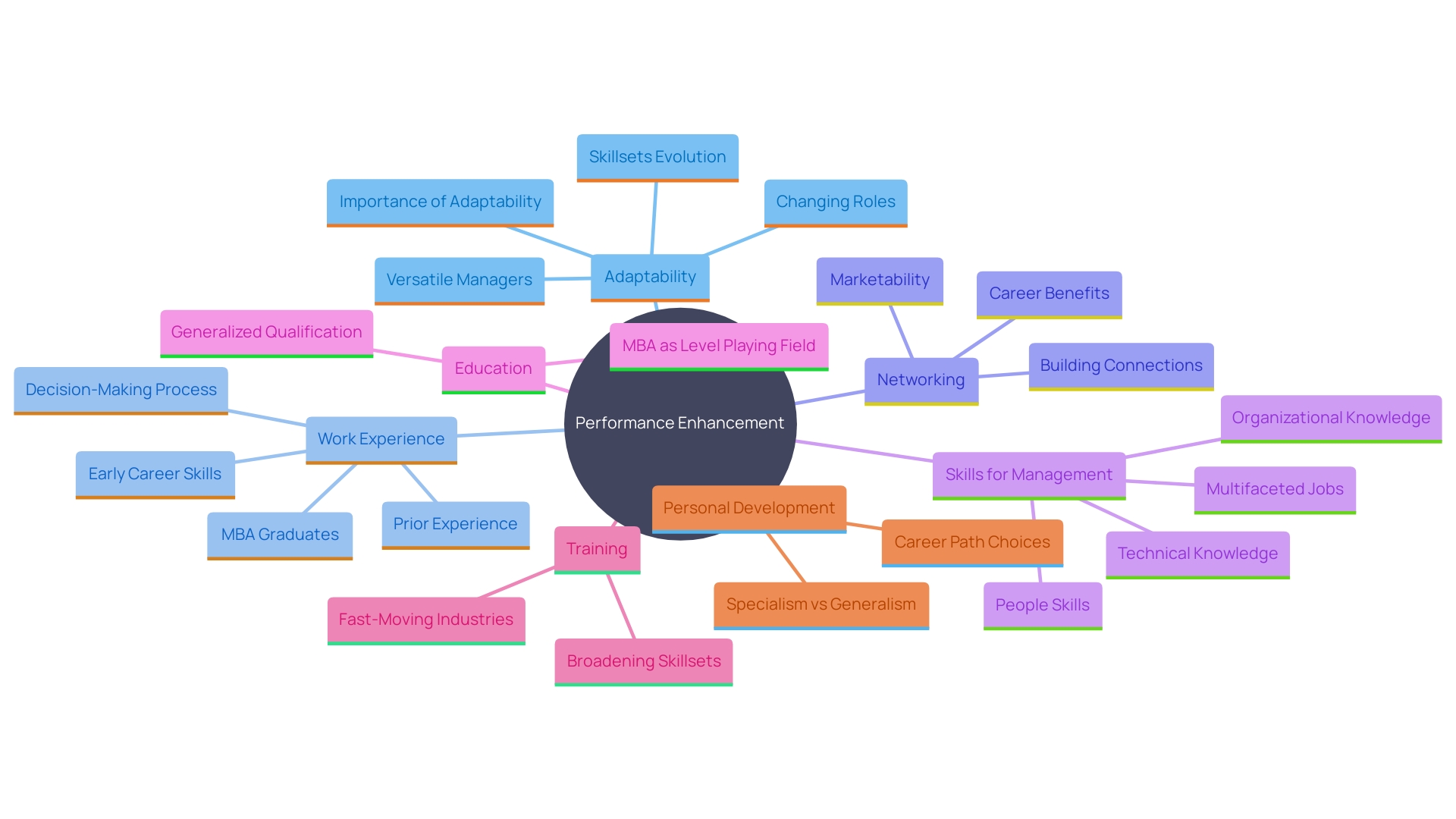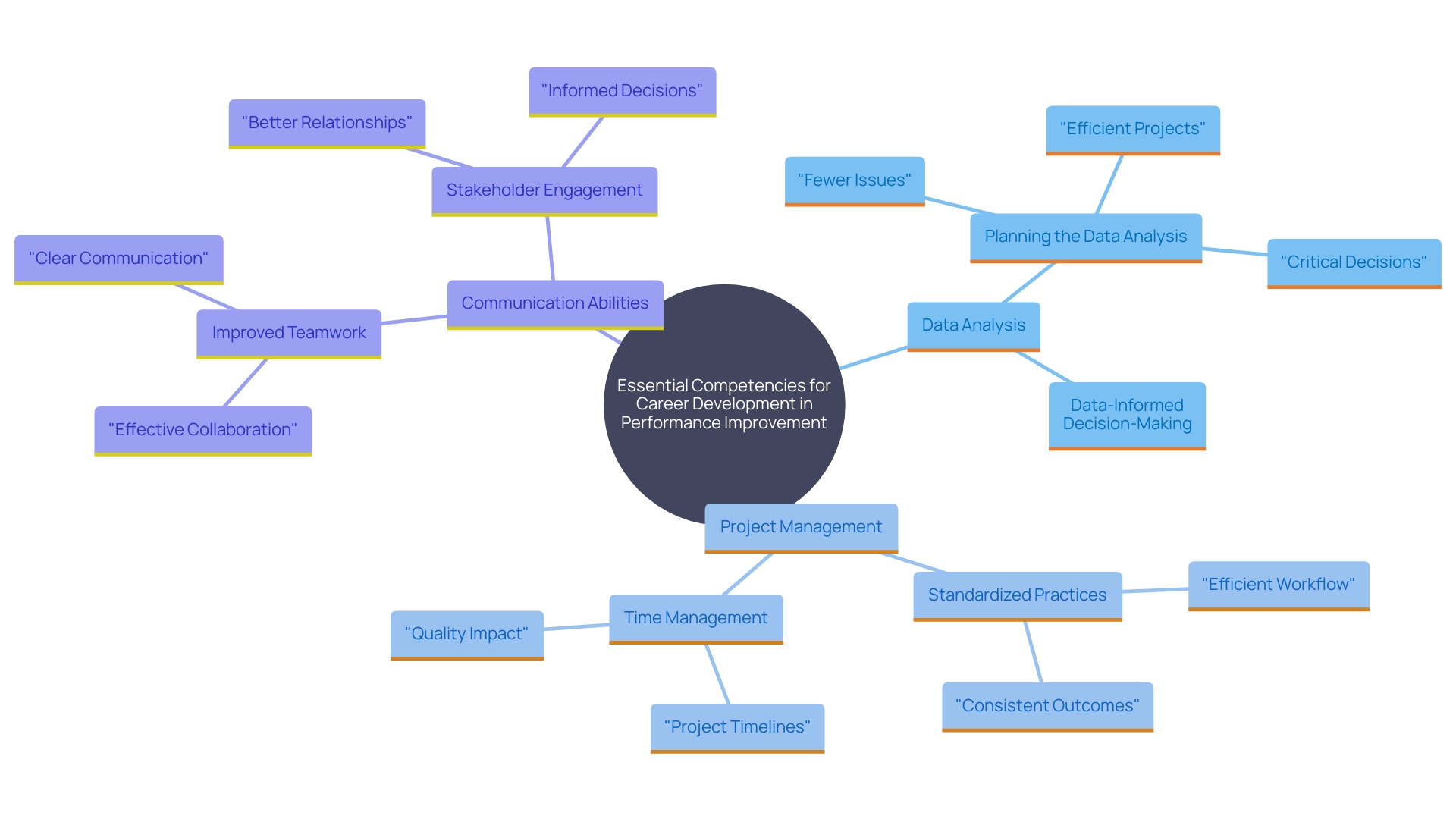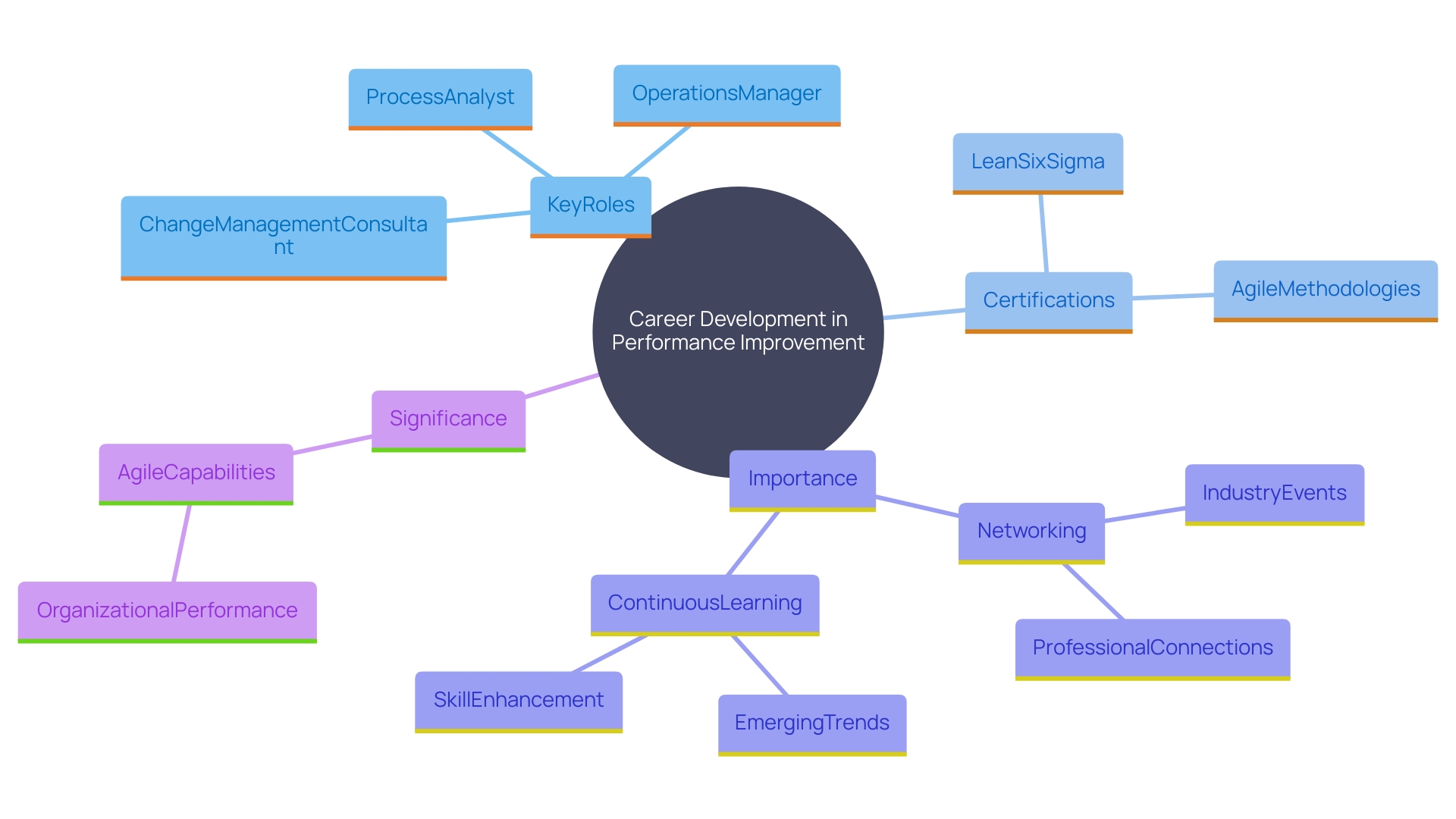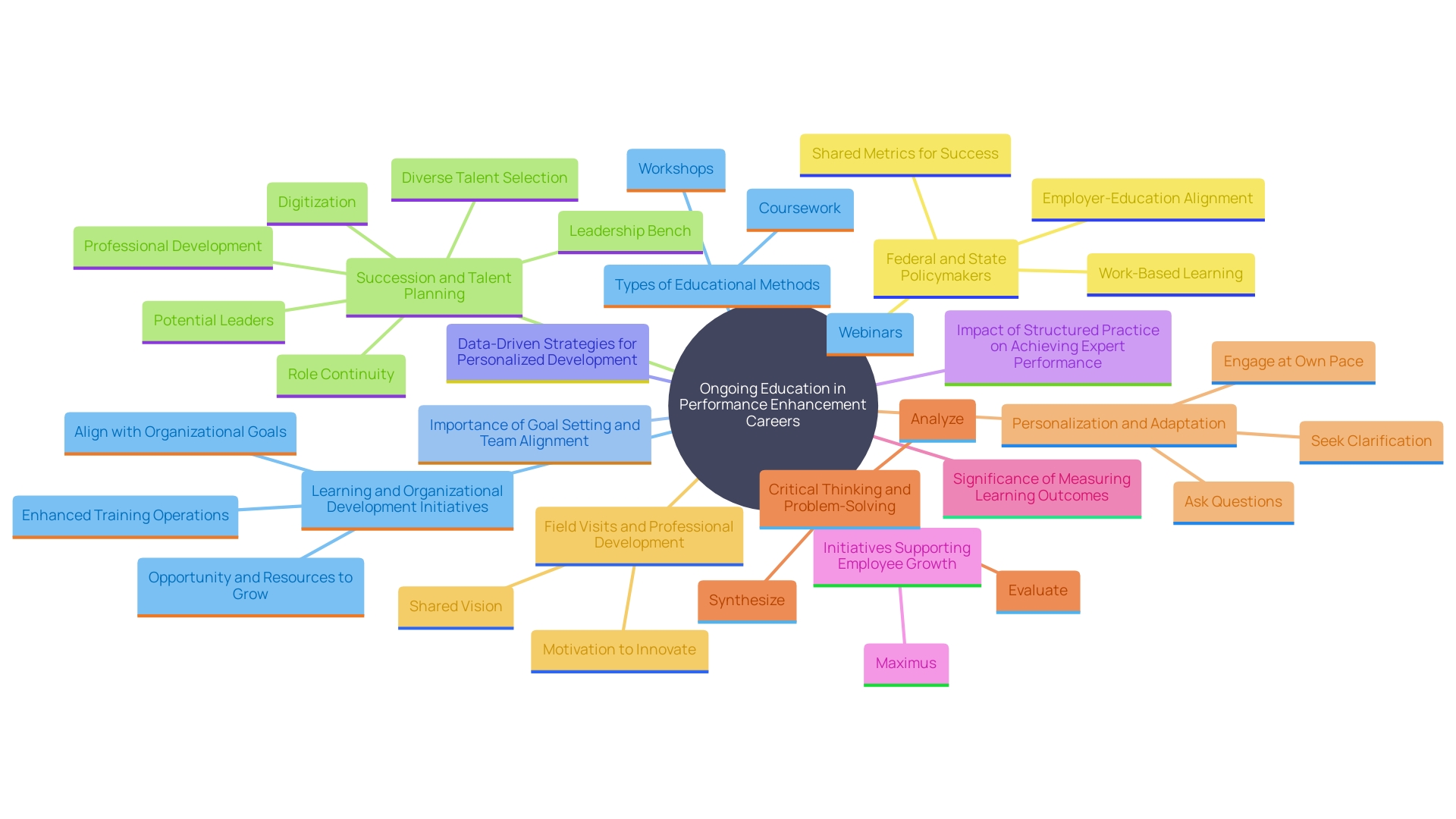Introduction
In today's rapidly evolving business landscape, the ability to navigate different career paths, especially within performance improvement, has become a prized asset. Exploring diverse roles not only enhances one's adaptability and marketability but also positions professionals as indispensable assets to their organizations. The myriad benefits of this exploration range from acquiring relevant skill sets early in one's career to broadening one's professional network and gaining practical, hands-on experience.
As industries continue to favor versatile managers who can thrive in dynamic environments, the importance of continuous learning and professional growth cannot be overstated. This article delves into key areas for professional development, the significance of certifications, and the role of ongoing education, providing actionable insights for those looking to excel in performance improvement careers.
Benefits of Exploring Different Career Paths
Investigating different professional avenues within performance enhancement presents many benefits. At the beginning of a person's career, the abilities gained must stay applicable throughout their working life to guarantee that the initial investment in education and training is worthwhile. As roles, abilities, and expectations change, the capacity to adjust becomes essential. This adaptability is especially valued in fast-moving industries where flat organizational structures favor managers who are flexible and versatile.
Participating in various roles enables professionals to expand their abilities, enhancing their adaptability and marketability in a competitive job market. For example, a study focusing on MBA graduates revealed that these individuals often enter multifaceted management roles requiring a blend of people skills, technical knowledge, and organizational insight. The choice to focus or stay broad often relies on an individual's previous experience and the expected future advantages.
Moreover, research indicates that 61% of employees believe that work experience best prepares them for their roles, followed by formal on-the-job training (41%) and life experience (37%). This emphasizes the significance of practical, hands-on education in professional growth.
Heather Dean, Assistant Director at the FDA, emphasizes the importance of expanding one's network and learning from others' professional journeys through informational interviews. This method not only expands an individual's viewpoint but also aids in recognizing strengths and preferences, ultimately resulting in improved job satisfaction and professional fulfillment.
By pursuing varied career paths, individuals can increase their value to employers, making them indispensable assets in any organization.

Key Areas of Improvement for Professional Growth
To enhance career development in performance improvement, individuals should focus on essential competencies such as data analysis, project management, and communication abilities. Skill in data analysis enables individuals to ground their choices on strong empirical evidence, as emphasized by the City of Thunder Bay's focus on establishing achievable objectives and preventing production delays through prompt data-informed decisions. Effective project management is crucial to ensure that initiatives are executed both efficiently and effectively. Jonathan Addison, Professional Services Manager at Prometheus Group, underscores the importance of standardizing project management practices to bridge communication gaps and enhance collaboration among project teams and stakeholders. Furthermore, enhancing communication abilities is essential for promoting teamwork and aligning stakeholders with organizational objectives. This facilitates smoother implementation of improvement initiatives, as seen in Thunder Bay's success with cross-departmental discussions to address knowledge gaps and share critical information. By concentrating on these areas, experts can maneuver through the intricacies of performance enhancement with greater agility and success.

Career Development Opportunities in Performance Improvement
Career development opportunities in performance improvement are vast and varied, encompassing roles such as process analyst, Operations Manager, and change management consultant. Obtaining certifications like Lean Six Sigma or Agile methodologies can significantly enhance your qualifications and open doors to leadership roles in driving organizational excellence. For instance, the Lean Six Sigma Green Belt certification provides a comprehensive understanding of process enhancement and quality management, equipping individuals with the skills necessary to lead and manage improvement projects effectively. Meanwhile, the Lean Six Sigma Black Belt certification explores advanced concepts and techniques, equipping individuals to oversee intricate projects and guide other experts.
Networking plays a crucial role in career advancement. Engaging in industry events, workshops, and online forums can lead to mentorship opportunities and exposure to best practices. Events like the SIOP Annual Conference offer an opportunity to engage with colleagues and specialists in the field, encouraging significant conversations and lasting career relationships. This aligns with the broader trend of enhancing workplace wellness and employee experience, as noted by industry experts who emphasize the importance of supporting employee mental health through research and practical implementation of wellness strategies.
Statistics indicate that more than 65% of organizations with strong nimble capacity outperform their counterparts in adapting to change, emphasizing the significance of agile and flexible capabilities in today's dynamic business landscape. By continuously enhancing your skills and broadening your network, you can position yourself as a valuable asset capable of driving substantial improvements in operational efficiency and overall quality within your organization.

The Role of Continuous Learning in Performance Improvement Careers
Ongoing education is a cornerstone for professionals in performance enhancement careers, enabling them to remain at the forefront of industry trends, tools, and methodologies. Engaging in ongoing education through workshops, webinars, or formal coursework is essential to staying competitive and addressing emerging challenges effectively. 'Embracing lifelong education fosters agility, allowing individuals to pivot as necessary and implement innovative solutions that drive organizational success.'.
In practice, this involves setting clear, actionable goals and ensuring team alignment through regular feedback sessions. For instance, Company C's approach to collaborative development has consistently enhanced team performance and workplace satisfaction. Furthermore, data-driven educational strategies—such as personalized development paths based on job roles and skill levels—are essential in customizing training to address specific needs. This not only boosts employee involvement but also guarantees the relevance and effectiveness of the educational material.
The significance of a structured educational approach is emphasized by research from K. Anders Ericsson and his colleagues, who point out that attaining expert performance necessitates roughly 10 years of intentional practice. This practice must be structured, involving specific tasks and continuous feedback. By concentrating on such intentional practice, experts can master new skills and adjust to the changing requirements of their positions.
Moreover, initiatives such as those introduced by Maximus showcase a dedication to ongoing education. These initiatives support employees in pursuing higher education, non-degree courses, and certifications aligned with their career aspirations, thus fostering a culture of growth and development within the organization.
Ultimately, the ability to measure and track learning outcomes—through metrics like knowledge retention, course completion rates, and qualitative feedback—is crucial. Such data-driven approaches enable organizations to refine their training programs, ensuring that employees are equipped with the skills needed to thrive in a rapidly changing professional landscape.

Conclusion
Exploring diverse career paths within performance improvement is not merely an option but a necessity in today’s competitive landscape. The benefits of gaining varied experiences are clear: they enhance adaptability, broaden skill sets, and increase marketability. Professionals who engage with different roles are better positioned to meet the evolving demands of their organizations, ensuring that their initial investments in education and training yield significant returns over time.
To foster professional growth, emphasis must be placed on key competencies such as data analysis, project management, and communication skills. Mastery in these areas empowers professionals to make informed, evidence-based decisions and execute initiatives efficiently. By refining these essential skills, individuals can navigate the complexities of performance improvement and contribute meaningfully to their organizations.
Moreover, the pursuit of continuous learning is critical for staying relevant in a rapidly changing environment. Engaging in ongoing education and certification programs not only enhances qualifications but also facilitates career advancement. Networking opportunities further bolster professional development, providing access to mentorship and industry best practices.
As organizations increasingly rely on agile and adaptable professionals, the commitment to lifelong learning becomes paramount.
In summary, embracing a multifaceted approach to career development—through exploring diverse roles, honing key competencies, and committing to continuous learning—positions professionals as invaluable assets in performance improvement. By taking proactive steps in these areas, individuals can drive significant operational efficiencies and contribute to their organization’s success in a dynamic business environment.




